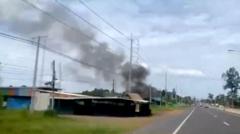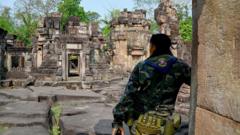A surge of animosity between Thailand and Cambodia manifests in a war of words online as border tensions escalate, with national identity and cultural pride igniting further disputes.
Tensions Escalate as Thailand and Cambodia Engage in Social Media Warfare Amidst Border Clashes

Tensions Escalate as Thailand and Cambodia Engage in Social Media Warfare Amidst Border Clashes
Heightened nationalistic sentiments fuel online confrontations as real-world border disputes lead to social media backlash.
As the border clashes this week killed more than a dozen people in Thailand and Cambodia, regional governments have been scrambling to stave off the threat of full-scale conflict between the two neighboring nations. However, an equally intense battle is playing out in the digital realm, as citizens of both countries engage in aggressive exchanges on social media platforms. Long-held nationalistic sentiments related to territorial rights, cultural symbols, and shared history have been ignited, leading to fierce online disputes.
The exchanges have reached a boiling point following the deadly clashes last Thursday, which served as a catalyst for young people from both nations to amplify their grievances online. Social media comment sections have morphed into battlegrounds where Thai and Cambodian users vehemently argue and support their governments' narratives. One Cambodian TikTok user demanded "Justice for Cambodia," claiming that Thai troops initiated the violence, while a Thai counterpart retorted by questioning the credibility of Cambodia, likening it to a country of scams. This back-and-forth has seen trending hashtags like "#CambodiaOpenedFire" and "Thailand opened fire," showcasing polarizing perspectives between the two sides.
The border skirmishes have aggravated an already tense relationship that dates back over a century, with recent military escalations resulting in travel restrictions and bolstered military presence along the border. A joint statement from Cambodian and Thai journalists emphasized the need for responsible sharing on social media, warning that misinformation could incite further hostility.
The tension has spilled over into real-life confrontations as well. A viral video circulated showing a Thai man verbally and physically confronting Cambodian workers, highlighting the potentially dangerous ramifications of this digital animosity. Wilaiwan Jongwilaikasaem, journalism professor at Thammasat University, characterized this rising nationalistic fervor as a "war of hate" that risks escalating beyond online exchanges.
Cultural issues are at the heart of this conflict, with grievances over historical claims stretching back to the 11th Century, centered around Preah Vihear temple and other heritage sites. Recent disputes have also arisen over cultural identity, particularly concerning the styles and names of traditional sports and practices that both nations claim ownership over.
Political rhetoric on social media has also intensified the conflict, with leaders like Thailand’s former Prime Minister Thaksin Shinawatra and Cambodia's Hun Sen exchanging barbs that exacerbate national tensions. Their fraught history, combined with divisions created by leaked communications, has only served to deepen the divide.
While a ceasefire has been proposed by Cambodia, the pervasive online war appears likely to continue, as users on both sides remain deeply invested in claiming narrative dominance. Even as diplomatic solutions are sought, the power of social media remains a formidable tool in shaping public perception and national identity amid conflict.
Additional reporting by Paweena Ninbut
The exchanges have reached a boiling point following the deadly clashes last Thursday, which served as a catalyst for young people from both nations to amplify their grievances online. Social media comment sections have morphed into battlegrounds where Thai and Cambodian users vehemently argue and support their governments' narratives. One Cambodian TikTok user demanded "Justice for Cambodia," claiming that Thai troops initiated the violence, while a Thai counterpart retorted by questioning the credibility of Cambodia, likening it to a country of scams. This back-and-forth has seen trending hashtags like "#CambodiaOpenedFire" and "Thailand opened fire," showcasing polarizing perspectives between the two sides.
The border skirmishes have aggravated an already tense relationship that dates back over a century, with recent military escalations resulting in travel restrictions and bolstered military presence along the border. A joint statement from Cambodian and Thai journalists emphasized the need for responsible sharing on social media, warning that misinformation could incite further hostility.
The tension has spilled over into real-life confrontations as well. A viral video circulated showing a Thai man verbally and physically confronting Cambodian workers, highlighting the potentially dangerous ramifications of this digital animosity. Wilaiwan Jongwilaikasaem, journalism professor at Thammasat University, characterized this rising nationalistic fervor as a "war of hate" that risks escalating beyond online exchanges.
Cultural issues are at the heart of this conflict, with grievances over historical claims stretching back to the 11th Century, centered around Preah Vihear temple and other heritage sites. Recent disputes have also arisen over cultural identity, particularly concerning the styles and names of traditional sports and practices that both nations claim ownership over.
Political rhetoric on social media has also intensified the conflict, with leaders like Thailand’s former Prime Minister Thaksin Shinawatra and Cambodia's Hun Sen exchanging barbs that exacerbate national tensions. Their fraught history, combined with divisions created by leaked communications, has only served to deepen the divide.
While a ceasefire has been proposed by Cambodia, the pervasive online war appears likely to continue, as users on both sides remain deeply invested in claiming narrative dominance. Even as diplomatic solutions are sought, the power of social media remains a formidable tool in shaping public perception and national identity amid conflict.
Additional reporting by Paweena Ninbut
















